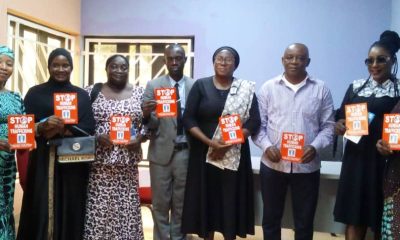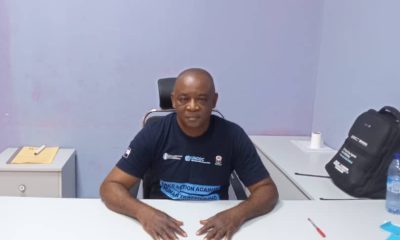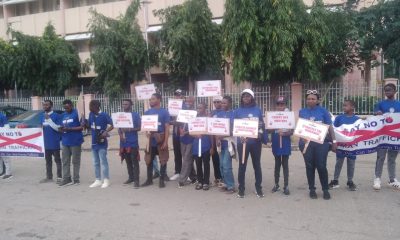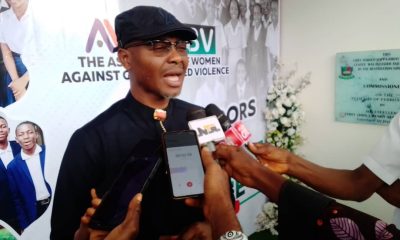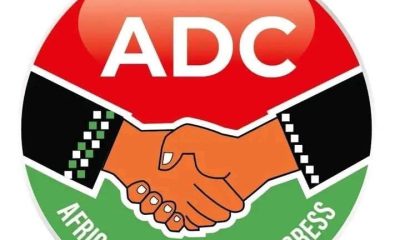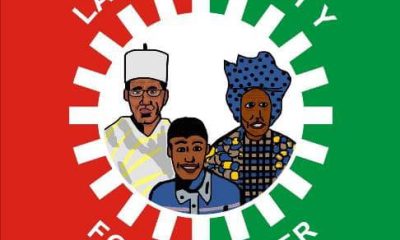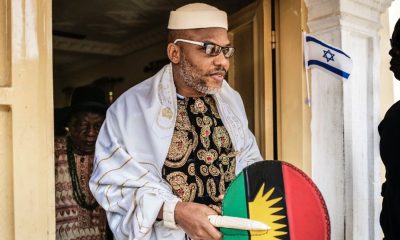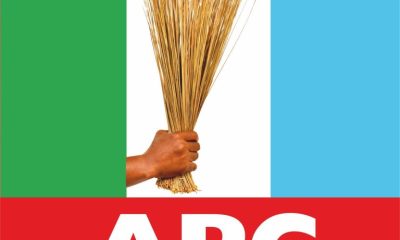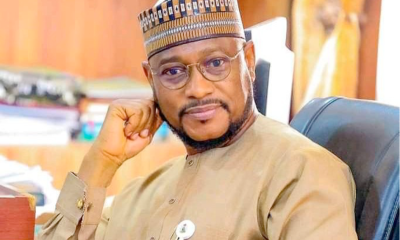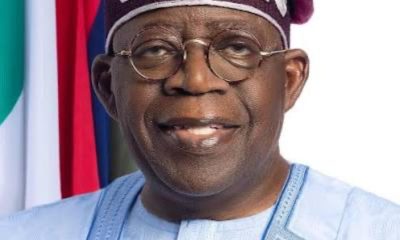Uncategorized
Poverty, Urge for quick affluence, lack of accountable govt Are Responsible for human trafficking, drug abuse,GBV– Ex-IYC President ..as AWAGBV inaugurates child Ambassadors against child abuse in Bayelsa schools
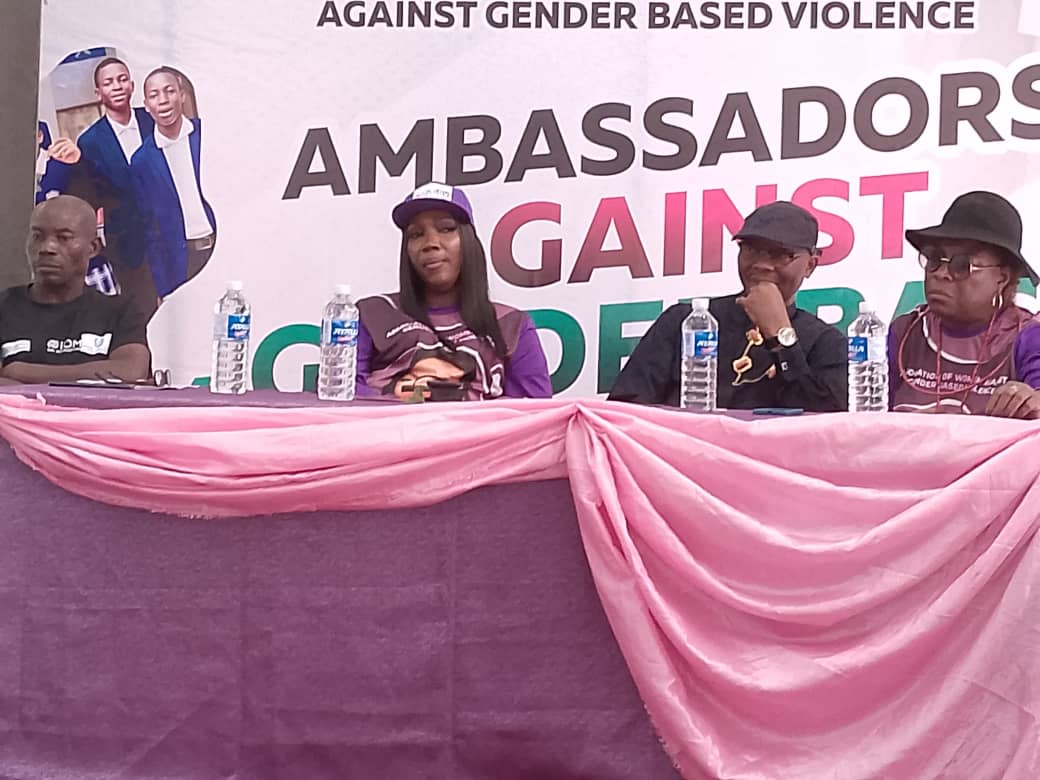
By David Owei,Bayelsa
A former President of the umbrella body of the Ijaw Youths Council (IYC) and Chieftain of the All Progressives Congress, APC, in Delta State, Dr. Chris Ekiyor, has identified poverty, the hunger for quick alliance and lack of accountable government as reasons for the worrisome increase in cases of human trafficking, drug abuse and Gender based violence in the country.
Dr. Chris Ekiyor, who made this known on Monday in Yenagoa during the the maiden edition of Association of Women Against Gender Based Violence (AWAGBV) Teenage Summit with the theme ” Raising Teenage Ambassadors against Human Traffickers and propagators of domestic violence”, said lot of desperation among this young one to find a part way to quick living by wanting to travel abroad at the risk of their lives and get involved in drug abuse, prostitution, drug trafficking has spiked the dangerous living in the society.
Chris Ekiyor, who hold P.hD in Public Health and served as a former Patani local government council, however called on women groups and female politicians to consistently served as mentor to the girl and boy child and shape their mind against social vices that will destroy their future.
According to him, “We all know that in Africa, been a woman put you in the disadvantage position, your parents want you to get married and the society and that brings about circumventing the potential of the girl child”
“So am happy to know that women are rising up to the challenges by mentoring young ones to compete with their fellow men and preparing them for the position of authority in government and the society.”
“However, there are a lot of desperation among this young one to find a part way to quick living by wanting to travel abroad at the risk of their lives, they also get involved in drug abuse, prostitution, drug trafficking, human trafficking and this are promoted by people of influence, people with resources , people at the helm of power by providing them substance of abuse by making them to believe that they can better their lives by indulging in them.”
“Society is failing this generation, whatever professional you are today, everybody want to leave the country because of the system we find ourselves. Government and society are no longer accountable to the people and many are beginning to think in that direction. People will promised them a good life abroad and they will just jump into the boat,hence the japa syndrome”
“You can see that the Morocco and Burkina Faso axis are death traps, most of the young people mind are not articulate the challenge of the society.They see greener pastures in decision they take.Nobody can make you look inferior without your consent, I have seen rich people children becoming a begger and poor people children becoming great in life by doing the right thing.”
“The society is corrupt, the politicians are corrupt but a time will come that people will be looking for truth, respectable, integrity people in the society and you can do it . As a woman, don’t under estimate yourself , don’t destroy yourself and the society by the choices you make. Don’t say it’s too late, it’s not about how far, but how well,” he said.
The head of Public Enlightenment for the State command of the National Agency for the Prohibition of Trafficking in Persons (NAPTIP),Mr. Wariebi Sambo, while reading the key note address from the former Director-General of the Agency, Dame Julie Okah-Donli,noted that for human trafficking to take place, there must be three basic elements, the act, the means and the purpose.
According to him, “The act is the recruitment stage where someone comes to the neighborhood with an enticing word, flashy cars, looking for a prey, that is the recruitment stage coming to people with convincing word”.
He said second aspect of it is the means which is by deception and for what purpose? We also have internal and external traffickers .
Traffickers are not written in the face, it could be anybody, that is why NAPTIP is telling the people to speak up when they see the Red Flag.”
” When somebody comes to you to say I want to take you abroad but say to you don’t tell anybody, is a red flag. And because of this African believe that virtually everybody is a witch so that they will not disrupt the movement is a trick used by traffickers, they tell the victims to take an oath which we called control mechanism. When you see all this things, the best thing is to report that is why NAPTIP is there for you”.
In her welcome address, the President of the Association of Women Against Gender Based Violence (AWAGBV) Barr Dise ogbise Goddy Harry said, Gender Based violence, human trafficking and drug abuse has become a threat to human existence and dangerous to the safety of the society if it is not urgently nip in the bud.
She pointed out that summit organised by the group AWAGBV, is to further create awareness against issues of gender based violence, human trafficking and drug abuse, “we are here to hear from professionals who knows there business in human trafficking, the business of gender based violence with wonderful panelists to deal with the issues on how we can chart a way forward”.
“The issues of human trafficking is thriving all over the world.The summit is to look at the challenges, why is it thriving all over the world . We advice our youths and the young ones to look out for the red flag that is why we have gathered together the Association of Women Against Gender Based Violence and other Women NGOs to deliberate on this dangerous menace and how to it bring to the bearest minimum.”
“At the end of the event, we hope to build a safe space, in fact we will be laying the foundation for survival of the victims of gender based violence . It is our desire that at the end of the event there will be wide publicity why we need to speak up against gender based violence and cases of human trafficking and drugs abuse so that at end of this event you will see stronger and more united women.”
“The Association of Women Against Gender Based Violence is not just about women, it is about women handling the issues of boys and girls child. It is an all encompassing conversation”, she said.
Uncategorized
ADC may join local contractors, Pensioners – Condemns Federal Government’s scandalous debts to both.
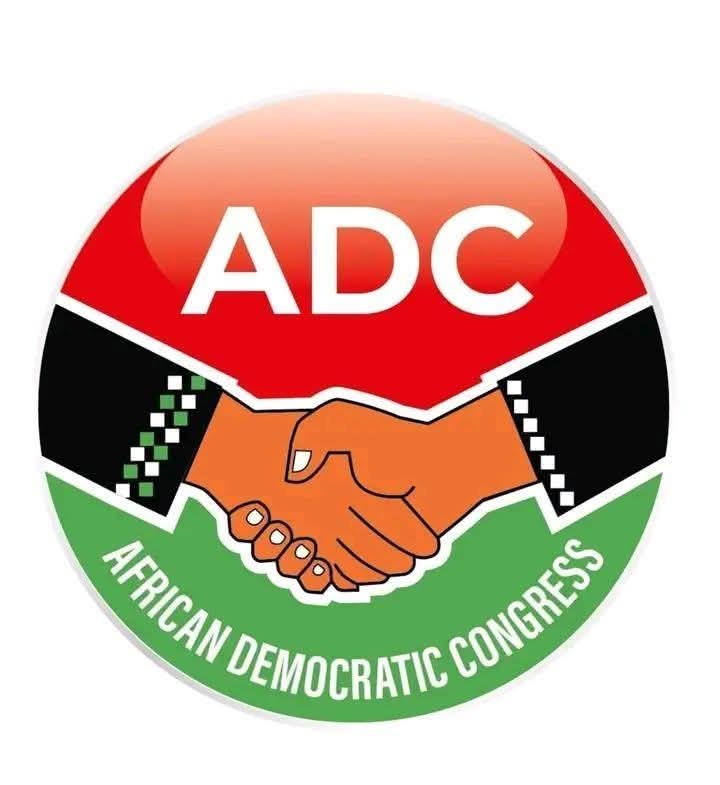
By George Mgbeleke
The African Democratic Congress (ADC) on Sunday said it is prepared to join the ongoing protests by local contractors and pensioners across the country if the Federal Government fails to respond to their plight.
In a statement signed by its National Publicity Secretary, Mallam Bolaji Abdullahi, the party condemned the Federal Government over its staggering debts to indigenous contractors and federal pensioners, saying it is a clear sign that the APC government does not care about the suffering of ordinary Nigerians.
The full statement read:
The ADC is deeply concerned by the MAY JOIN LOCAL CONTRACTORS, PENSIONERS PROTESTSplight of indigenous contractors who for several weeks have camped at the Federal Ministry of Finance with coffins, demanding to be paid for the work they have done.
We also stand in strong solidarity with pensioners who are now threatening to march naked in protest if the Federal Government fails to pay what it owed to them in long arrears of pensions.
No serious government allows things to deteriorate to the point where citizens must resort to coffins and naked protests before they are taken seriously. But this only further confirms that the APC government is insensitive and does not care about the damage that their actions or inactions do to the country’s image, and more importantly, to the livelihood of ordinary citizens.
What makes this even more troubling is that the same government responsible for this embarrassment keeps boasting about “meeting and surpassing revenue targets.” If our national finances are truly as strong as the government claims, why are contractors still owed over N500 billion for completed projects? Why are pensioners still waiting for increments and palliatives that were approved more than a year ago? You cannot claim revenue excellence while ordinary Nigerians are drowning in unpaid debts. Something is not adding up.
And, instead of this crisis, the APC-led government is busy distributing campaign vehicles, mobilising coordinators, and building structures for 2027. A government that cannot pay its own contractors and cannot honour its obligations to pensioners has absolutely no moral right to be campaigning for another term.
We have taken note of the untold suffering and humiliation that both the contractors and the pensioners have had to endure. This has to end now. The ADC is therefore prepared to march in solidarity with them if the government refuses to act immediately to address their plight.
ADC will continue to stand with all citizens who have been pushed into hardship by this APC-led federal government’s failures. Where this government destroys trust, we will rebuild it. Where they abandon their responsibilities, we will uphold them.”
Uncategorized
Wike -led PDP Pledges Support for NWC …Vows Unity …As Ohuabunwa says Party must unite, adhere to Laws
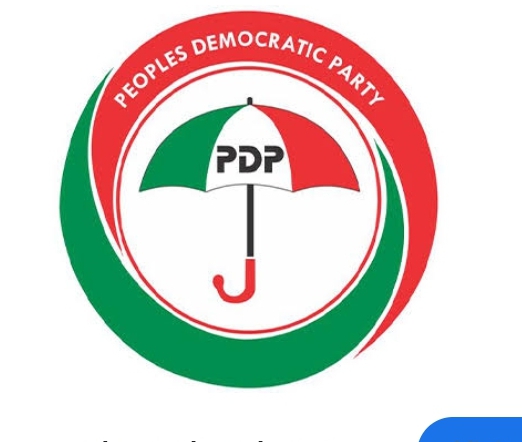
By Our Correspondent
Senator Mao Ohuabunwa, Chairman of the factional Board of Trustees (BoT) of the Nyesom Wike-led PDP, has emphasized the importance of unity and adherence to party laws and guidelines.
Speaking on Sunday during the opening session of the BoT meeting at the Life Camp official residence of FCT Minister , Barr Nyesom Wike, Ohuabunwa pledged the group’s support for the National Working Committee (NWC) and efforts to reorganize affected states.
“We are going to work with this NWC, we are going to encourage them, we are going to support them to ensure that the right things are done, and that things will be done in line with the law and the guidance of our great party, the NWC. Like I said, we are also making meaningful progress in reorganizing affected states, including the Constitution of Credible Caretaker Committees, to prepare the ground for transparent congresses and subsequent convention process.
These efforts are aimed at building trust, strengthening internal structures, and ensuring that our party remains a model of fairness and inclusiveness in Nigerian democratic space.
“As the Constitution of our party entails, the Board of Trustees must continue to provide stability, wisdom, and moral guidance. Our responsibility is to safeguard the party’s soul, steer it away from divisive tendencies, and reinforce the values that have historically set the PDP apart as a disciplined and a democratically established institution. In this defining moment, therefore, we must rise above sentiments and act with unity of all.
“Our duty is clear, well stated, to consolidate the reforms already underway, deepen internal cohesion, and ensure that the People’s Democratic Party emerges stronger, more virile, more united, and fully prepared for the leadership responsibilities ahead. I thank you all for your steadfastness, for your dedication and commitment, and your loyalty to our great Party. This is the time we should stand to be counted”
“BOT is the conscience of the party, we are the moral compass, and we wouldn’t want to behave or become complicit. We must stand and face the truth, and ensure that this party stands to be counted at all times in our obedience to the laws of the Federation, the law of our party, and the guidelines of the regulatory body, which is the Independent national Electoral Commission. I want to thank you all for coming”.
The meeting, held amidst apparent internal party tensions, aims to consolidate reforms, deepen internal cohesion, and prepare the PDP for future leadership responsibilities.
The meeting reflects ongoing efforts within the PDP to address internal challenges and position itself for future electoral success.
“These efforts are aimed at building trust, strengthening internal structures, and ensuring that our party remains a model of fairness and inclusiveness in Nigerian democratic space”
Uncategorized
NCDMB Unveils $100m Equity Investment Scheme as Nigerian Content Hits 61% in 2025
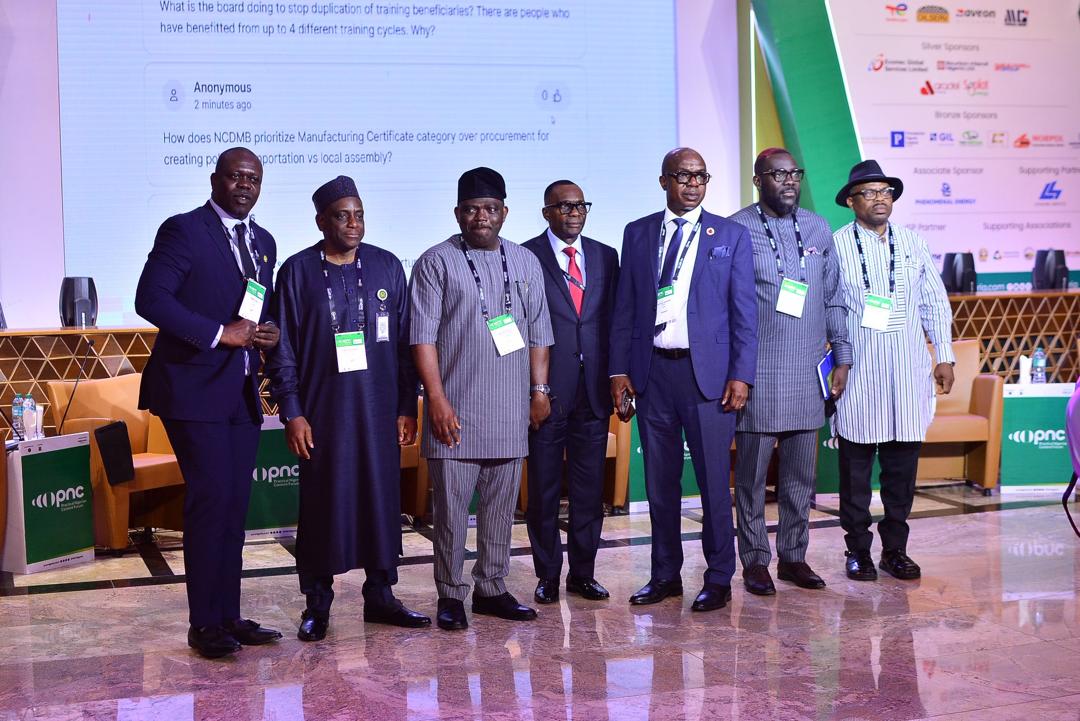
By David Owei.
The Nigerian Content Development and Monitoring Board (NCDMB) has unveiled a $100 million Equity Investment Scheme among a raft of fresh initiatives to bolster indigenous capacity and participation in the oil and gasindigenous capacity and participation in the oil and gas industry. The Executive Secretary of the NCDMB, Engr. Felix Omatsola Ogbe announced this in a keynote address he delivered at the opening day of the 14th Practical Nigerian Content Forum, which ended on Thursday.
The capacity audience included three ministers of state, members of the Local Content Committees of the National Assembly, a representative of the Bayelsa State Governor, Special Adviser to the President on Energy, two former Executive Secretaries of the NCDMB, Managing Director, Bank of Industry, and captains of the oil and gas industry.According to Engr. Ogbe, the $100 million Equity Investment Scheme would “provide equity financing to high-growth indigenous energy service companies, while diversifying the income base of the Nigerian Content Development Fund (NCDF).”In furtherance of the $100 million Equity Investment Scheme, a memorandum of understanding (MOU) was signed at the event between Engr. Ogbe and the Managing Director of the Bank of Industry, Dr. Olasupo Olusi, toward management of the scheme, which is a new product of the Nigerian Content Intervention Fund (NCI Fund). The NCDMB boss also announced that 61 per cent Nigerian Content level already attained in the oil and gas sector by the third quarter of 2025 from the projects being monitored by the Board.Another major announcement was the Board’s readiness to onboard a new set of Project 100 Companies after the successful implementation of approved interventions relating to the first set of Project 100 Companies, launched in 2019, for which an exit plan is slated for April 2026. Project 100 Companies is an initiative of the Ministry of Petroleum Resources and the NCDMB under which 100 indigenous companies in the oil and gas industry are nurtured and empowered to higher levels of competitiveness through capacity building and access to market opportunities.He also said the Board has concluded plans to launch its NCDMB Technology Challenge in the first quarter of 2026 and to hold a Research and Development Fair in the second quarter of 2026. In addition, a review of the Board’s seven current guidelines is to be undertaken between the first and second quarter of 2015. Engr. Ogbe further disclosed that the Board has completed the framework for issuance of NCDF Compliance Certificate, an instrument to confirm that a company in the oil and gas industry has complied with the one per cent remittance obligations. The Certificate will become effective on Ist January 2026 and would be required to obtain key permits and approvals from the Board. Among recent accomplishments of the Board announced by the NCDMB boss was the expansion of access to community contractors under the Community Contractors Scheme, with over 94 disbursements made in 2025 alone. In addition, the Nigerian Content Academy has commenced operation as a full-fledged division of the Board, with seven of its Lecture Series on key industry issues already organised. On human capacity development (HCD), the NCDMB has rolled out its Oil and Gas Field Readiness Training Programme for top 10 skills in high demand, on the back of the surge in final investment decisions (FIDs) on big-ticket projects in the oil and gas industry and over 20 Field Development Plans recently approved by the Nigerian Upstream Petroleum Regulatory Commission (NUPRC).
The Programme is to ensure availability of indigenous technical capacity at the take-off of the projects. The construction of the multibillion-naira Oloibiri Museum and Research Centre (OMRC) at Otuabagi in Ogbia Local Government Area of Bayelsa State has also taken off, with the execution of a contract between the construction firm, Julius Berger Plc, and OMRC Limited in December 2024, while mobilisation to site was achieved in July 2025. Jointly sponsored by the Petroleum Technology Development Fund (PTDF), NCDMB, Shell Petroleum Development Company (now Renaissance Africa Energy Limited), and Bayelsa State Government, the project is expected to be delivered within 30 months.In a presentation, the Chairman, Senate Committee on Local Content, Senator Joel Thomas, expressed concern that some indigenous companies have consistently flouted provisions of the Nigerian Oil and Gas Industry Content Development (NOGICD) Act, 2010, as relates to one per cent remittance to the Nigerian Content Development Fund (NCDF).
His counterpart in the House of Representatives, Hon. Boma Goodhead, commended the NCDMB for sustaining the PNC Forum and Exhibition over the years and for ably guiding industry drive toward attainment of objectives of the NOGICD Act.In his ministerial address, the Minister of State for Petroleum Resources (Gas), Rt. Hon. Ekperikpe Ekpo, said the theme of the PNC Forum, “Securing Investments, Strengthening Local Content, and Scaling Energy Production,” captures Nigeria’s national priorities that guide interventions by the Board and his Ministry.He emphasised that “Investment remains the lifeblood of the energy sector,” and that the Board and the Ministry are committed to providing stable policies, transparent processes, and market-driven incentives, to attract long-term capital. He assured that they would “continue strengthening local capacity across fabrication, engineering, technology services, manufacturing of components, and research and development.”For his part, the Minster of State for Petroleum Resources (Oil), Senator Heineken Lokpobiri, noted with satisfaction that a decade-long stagnation in the oil and gas industry was overcome with the enactment of the long-delayed Petroleum Industry Act (PIA), 2021, and Presidential Directives issued by the Administration of President Bola Ahmed Tinubu in March 2024.According to him, Nigeria has regained investor-confidence as signalled by the recent surge in FIDs and the increase of oil rigs from 14 to over 60, with 40 currently in active service. “Our investment climate now is globally competitive…our fiscal terms are globally competitive,” he added, while pointing out that “Our policies must be seen to be consistent” at all times.”He assured that the Federal Government is prepared to support Nigerian Content and the oil and gas industry, but that “things have to be done responsibly.”The Minister disclosed that “Nigeria has met all its obligations to the African Energy Bank,” and that its Abuja corporate headquarters is fully set with furnishing and all required operational equipment.
Also speaking, the Minister of State for Industry, Senator John Owan Enoh said Nigeria stands at the edge of a profound energy transition “not just a transition from fossil to cleaner fuels, but a transition from import dependence to production strength, from resource extraction to value creation, and from talking about local content to building true local a capacity across value chains.”
In a goodwill message, the Managing Director, BOI, Dr. Olasupo Olusi, said that the collaboration between the NCDMB and BOI marked a significant expansion of a longstanding relationship, while assuring that through the $100 million NCIF Equity Investment Fund, “the Bank of Industry will deploy equity and quasi-equity capital to support high-potential Nigerian companies,” to complement traditional debt financing and “strengthening access to the long-term risk capital required for scale, competitiveness, and value creation.”According to the BOI boss, “With a single obligor limit of $5 million, the Fund is designed to catalyze multiple high-impact investments while maintaining strong governance and prudent risk management.” In a goodwill message, the Special Adviser to the President on Energy, Mrs. Olu A. Verheijen, commended the NCDMB for sustaining the PNC Forum, which she said, accelerates change, drives competitiveness, and pushes the industry toward global standards.She pointed out that as stakeholders chart the path toward building “a resilient, competitive industrial base in Nigeria,” they must be intentional – not incidental – about in-country value addition, and that the historic transfer of onshore assets from international oil companies (IOCs) to indigenous operators “reflects decades of accumulated local capability, technical maturity, and domestic capital formation.” According to her, “We have living proof of what happens when policy, ambition, and capability align: from SHI-MCI’s fabrication yards to Waltersmith’s modular refining success; from the NLNG Train 7 Project to the Nigerian Oil and Gas Park Scheme, and the expansive growth of Nigerian-owned marine vessels.”
-

 Business & Economy4 months ago
Business & Economy4 months agoPC-NCG Issues Disclaimer on Purported Nigerian Coast Guard National Orientation Exercise In Anambra State
-

 Entertainment1 year ago
Entertainment1 year agoJubilation galore as Parishioners of CKC Kurudu celebrate their cultural heritage ….FG should exploit our Cultural heritage to unite Nigerians-Rev Fr Dim
-

 Law & Crime6 months ago
Law & Crime6 months agoICPC pledges to collaborate with FIDA to end Sex for Marks in tertiary institutions
-

 General News1 year ago
General News1 year agoCelebration galore as UDA Successfully Elected New Exco ……I will digitalize processes that will raise UDA to greater height -Comr. Okejiri
-

 General News2 years ago
General News2 years agoReps hold public hearing on FMC Ugwuaji Awkunanaw
-

 Law & Crime5 months ago
Law & Crime5 months agoLegal practitioner raises alarm over threat to his life by CSP Muhammed Abdulkareem
-

 General News1 year ago
General News1 year agoKugbo Hill Tragedy: Trailer Crushes Car, Kills Four and Injures Several Others in Abuja
-

 Politics3 months ago
Politics3 months agoASUU-NDU protest against FG loans, unpaid salaries,Non-Implementation of agreements …..says loans is generational slavery

